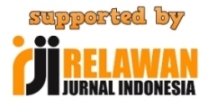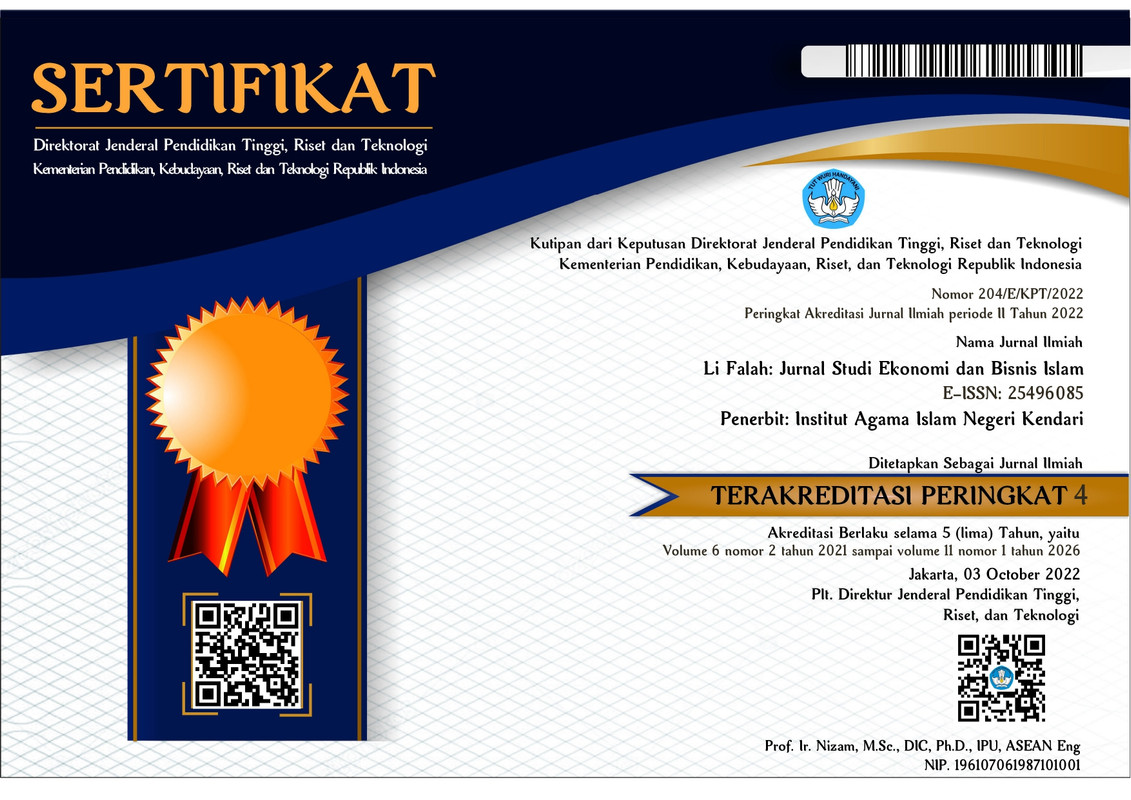Establishment of Waqf to Alleviate Poverty Among Muslims in Oyo State South-West, Nigeria: Test of Theory of Planned Behaviour
Abstract
Poverty is on the increase in Africa in general and specifically in Nigeria despite the numerous poverty alleviation programs of successive governments. Lamentably, most poverty alleviation initiatives have failed to produce meaningful outcomes despite billions of Naira committed to them. Nigerians and Nigeria still ranked among the poorest, with the poverty rate rising since the 1980s. Base on the theory of planned behavior, this study examines the influences of attitude, subjective norm, perceived behavioral control, Religiosity, and available information on the intention to establish Waqf in Oyo state, southwestern Nigeria. Survey data from 218 Islamic scholars revealed that all the variables, as mentioned earlier, except available data, have a significant positive influence on the intention to establish Waqf according to the respondents. Based on the results, the study made relevant policy recommendations regarding how authority can explore Waqf's institution as a formidable alternative to government-driven poverty alleviation programs in the interest of the Nigerian Muslims and the Nigerian Muslims, the larger population cutting across different religions.
Keywords
Full Text:
PDFReferences
Abdullah, N., & Abd-Majid, M. S. A. (2003). The Influence of Religiosity, Income and Consumption on Saving Behavior: The Case of International Islamic University Malaysia (IIUM). Jurnal Iqtisad, 4(1), 1-11.
AbdulKareem, I. A., Ogunbado, A. F., AbdulGaniyy, A., & Mahmud, M. S. (2019). Factors Motivating the Establishment of Waqf Institution towards Poverty Alleviation among Muslim Ummah in Oyo State, South West, Nigeria. Jurnal Manajemen Bisnis (JMB), 32(1), 41-59.
AbdulKareem, I. A., AbdulGaniyy, A., Mahmud, M. S., & Yazid, A. S. (2020). Alternative Way to Reducing Poverty and Inequality in Nigeria from Islamic Perspective. Journal of Islamic Banking and Finance, 37(2), 73-83.
Adeyonu, A. G., Oni, O. A., Okoruwa, V. O., & Omonona, B. T. (2012). Seasonality in Poverty Level of Rural Farming Households in Oyo State Nigeria. ARPN Journal of Agricultural and Biological Science, 7(8) 570-575.
Achuonye, K. A. (2017). Education in Nigeria for value re-orientation, poverty eradication and national development. In A paper presented at the 19th Nafak Conference at the University of Port Harcourt, Choba Rivers State, Nigeria. 13th-17th March.
Ahmad, W. M. W., Rahman, A. A., Ali, N. A., & Seman, A. C. (2008). Religiosity and banking selection criteria among Malays in Lembah Klang. Shariah Journal, 16(2), 279-304.
Ajzen, I. (2011). The theory of planned behaviour: reactions and reflections. Psychology & health, 26(9), 1113-1127.
Ajayi, A.R. (2009). The Role Expectations of Agricultural Extension in Poverty Alleviation in a Democratic and Deregulated Economy in J.U Agbamu (ed) Perspectives in Agricultural Extension and Rural Development, Asaba, Springfield Publishers.
Ajzen, I., & Fishbein, M. (1980). Understanding attitudes and predicting social behaviour. Englewood Cliffs, NJ: Pretice Hall.
Ajzen, I. and Fishbein, M. (2000). Attitudes and the attitude-behavior relation: reasoned and automatic processes, in Stroebe, W. and Hewstone, M. (Eds), European Review of Social Psychology, Wiley, New York, NY, 1-28.
Alaro, A. A. M., & Alalubosa, A. H. (2019). Potential of Sharī’ah compliant microfinance in alleviating poverty in Nigeria. International Journal of Islamic and Middle Eastern Finance and Management. 115-129.
Ali, I. B. (2009). Waqf: A sustainable development institution for Muslim communities. Takaaful T&T Friendly Society, Trinidad and Tobago, available at www. takaafultt. org.
Amin, H., Rahim Abdul Rahman, A., & Abdul Razak, D. (2014). Customer acceptance of Islamic home financing. International Journal of Housing Markets and Analysis, 7(3), 307-332.
Amin, H., & Chong, R. K. (2011). Is the theory of reasoned action valid for Ar-Rahnu? An empirical investigation. Australian Journal of Basic and Applied Sciences, 5(10), 716-726.
Binti Saifuddin, F., Kayadibi, S., Polat, R., Fidan, Y., & Kayadibi, O. (2014). The Role of cash Waqf in poverty alleviation: Case of Malaysia. International Journal of Business, Economics and Law, 4 (1), 171- 179.
Dansabo, M. T. (2015). Assessing the developmental impact of poverty eradication programmes in Sokoto State, Nigeria. The Nigerian Journal of Sociology and Anthropology, 13(1).
Chabbal, A. Y. (2020). WAQF and Enterprenuership: An Ignored Mechanism for Modern Economic Development in Nigeria. Journal of African Sustainable Development, 20(2) 2218-8777.
Cohen, M. A. (1988). Some new evidence on the seriousness of crime. Criminology, 26(2), 343-353.
Gopi, M., & Ramayah, T. (2007). Applicability of theory of planned behavior in predicting intention to trade online: Some evidence from a developing country. International Journal of Emerging Markets, 2(4) 348-360.
John, O. A., & Bright, O. O. (2012). Poverty and youth unemployment in Nigeria, 1987-2011. International Journal of Business and Social Science, 3(20).
Kazeem, Y, (2018). Nigeria is set to stay the world’s poverty capital for at least a generation, Quartz Africa. https://qz.com/africa/1421543/nige rias-poverty-crisis-is-worseningoxfam-world-bank-data/
Krejcie, R. V., & Morgan, D. W. (1970). Table for determining sample size from a given population. Educational and Psychological Measurement, 30(3), 607-610.
Lada, C. J., Muench, A. A., Rathborne, J., Alves, J. F., & Lombardi, M. (2008). The nature of the dense core population in the Pipe Nebula: thermal cores under pressure. The Astrophysical Journal, 672(1), 410.
Legenhausen, M. (2016). A Muslim’s non-reductive religious pluralism. In Islam and Global Dialogue (pp. 71-94). Routledge.
Lukacs, P. M., Burnham, K. P., & Anderson, D. R. (2010). Model selection bias and Freedman’s paradox. Annals of the Institute of Statistical Mathematics, 62(1), 117-125.
Mannan M.A (2005) The Role of Waqf in Improving the Ummah Welfare. Presentation at the International Seminar on Islamic Economics as Solution. Organized by Indonesian Association of Islamic Economists and Muamalat Institute, Jakart. Medan, Indonesia.
McDaniel, S. W., & Burnett, J. J. (1990). Consumer religiosity and retail store evaluative criteria. Journal of the Academy of Marketing Science, 18(2), 101-112.
Mokhlis, S. (2009). Relevancy and measurement of religiosity in consumer behavior research. International Business Research, 2(3), 75.
Obikeze, O. S. A., & Ananti, M. O. (2015). The Challenges of Ending Rural Poverty: An Appraisal of National Poverty Eradication Programme (NAPEP). Journal of Policy and Development Studies, 289(1851), 1-11.
Ogunna, A.E.C. (2007). Basic issues in community development and local government. Owerri Versatile Publishers.
Orokpo, O. F., & Mutong, S. M. (2018). Nigeria’s Raising Poverty Profile Amidst Poverty Alleviation Programmes: Interrogating the Paradox. International Journal of Innovative Development and policy Studies, 6(2), 109-116.
Osman, S., Mati, I., Ahmad, J., & Haji-Othman, Y., (2015) Unlocking Value of Waqf Property Using Hibah Mudharabah: A Case study of Commercial Buildings in kedah, Malaysia, International Journal of Development Research,. 5(05), 4294-4299.
Pikkarainen, T., Pikkarainen, K., Karjaluoto, H., & Pahnila, S. (2004). Consumer acceptance of online banking: an extension of the technology acceptance model. Internet research, 14(3), 224-235.
Ramayah, T., Rouibah, K., Gopi, M., & Rangel, G.J. (2009). A decomposed theory of reasoned action to explain intention to use Internet stock trading among Malaysia investors. Computers in Human Behavior, 25(6), 1222-1230.
Ramayah, T., Md-Taib, F. and Ling, K.P. (2006). Classifying users and non-users of internet banking in northern Malaysia. Journal of Internet Banking and Commerce, 11(2), 1-13.
Sathye, M. (1999). Adoption of Internet banking by Australian consumers: an empirical investigation. International Journal of bank marketing, 17(7), 324-334.
Sekaran, U. (2003). Research methods for business: A skill building approach. John Wiley & Sons.
Sekaran, U., & Bougie, R. (2003). Research methodology for business. A skill building approach. John Wiley & Sons.
Shah Alam, S., & Mohamed Sayuti, N. (2011). Applying the Theory of Planned Behavior (TPB) in halal food purchasing. International Journal of Commerce and Management, 21(1), 8-20.
Shih, Y. Y., & Fang, K. (2004). The use of a decomposed theory of planned behavior to study Internet banking in Taiwan. Internet Research, 14(3), 213-223.
Tagoranao, M. S., & Gamon, A. D. (2019). Understanding the Religious Rights of the Muslims in the Philippines: A Catalyst for Peace and Justice (Kefahaman tentang Hak Beragama Orang Islam di Filipina: Pemangkin untuk Keamanan dan Keadilan). Journal of Islam in Asia, 16(1), 204-220.
The nation newspaper (2016). 85 percent of Nigerians live in poverty – Ngige. Retrieve online on 25th April 2020 from http://thenationonlineng.net/85-percent-nigerians-live-poverty-ngige/
Tunji, S.T., (2013), “Islamic banking as a panacea for economic instability in Nigeria”, Nigerian Chapter of Arabian Journal of Business and Management Review, 1(3).
Udofia, N., & Mkpa, P. (2016). An assessment of the impediments to the National Poverty Eradication Programme (NAPEP’s) objectives. IOSR Journal of Humanities and Social Science, 21(3), 05-13.
World Bank (1990). Poverty: World Development indicators. World Development Report. Retrieved online on 15th April 2020 from https://openknowledge.worldbank.org/bitstream/handle/10986/5973/WDR%2 01990%20-%20English.pdf?sequence=5&isAllowed=y.
World Bank (2001). World Development Report, attacking poverty. Retrieved online on 15th April 2020 from http://www.ssc.wisc.edu/~walker/wp/wp-content/uploads/2012/10/wdr2001.pdf
Yusuff, J. A., & Noor Aziza, C. E. (2013). Alleviation of poverty among OIC countries through sadaqat, cash waqf and public funding. International Journal of Trade, Economics and Finance, 4(6), 403.
Ziyaviddinovna, M. M., & Sagdullaevich, K. K. (2020). Poverty reduction by Islamic waqf system. Journal of Critical Reviews, 7(4), 68-73.
DOI: http://dx.doi.org/10.31332/lifalah.v5i2.2253
Copyright (c) 2020 Ibraheem Alani Abdulkareem

This work is licensed under a Creative Commons Attribution-ShareAlike 4.0 International License.
Li Falah : Jurnal Studi Ekonomi dan Bisnis Islam, Indexed In
Accredited By
View My Stats
Organized by : Fakultas Ekonomi dan Bisnis Islam
Published by : Institut Agama Islam Negeri Kendari
Jl. Sultan Qaimuddin No. 17 Baruga Kota Kendari Provinsi Sulawesi Tenggara
phone. +62401-3193710
Fax. +62401-3193710
Email: [email protected]



















